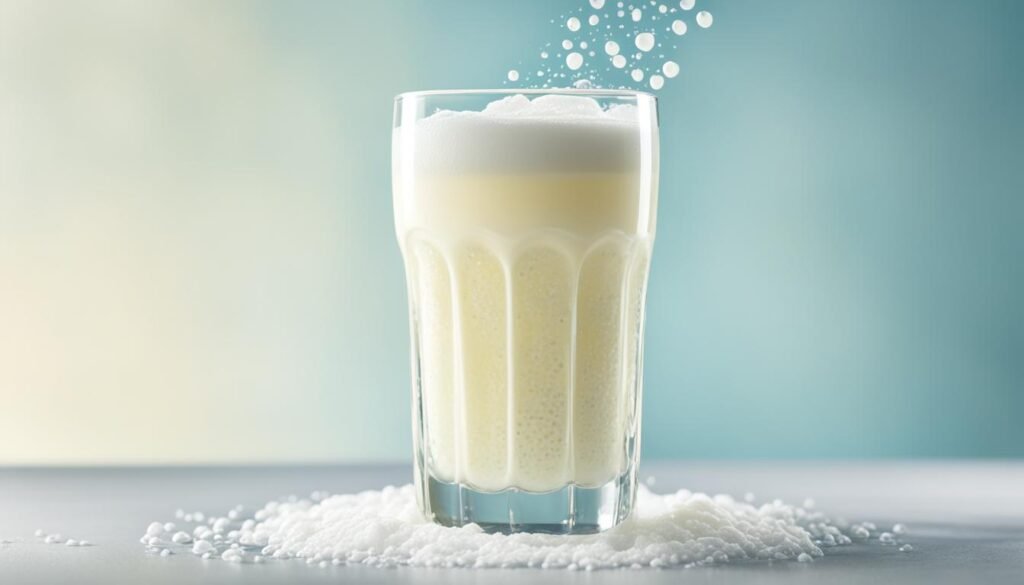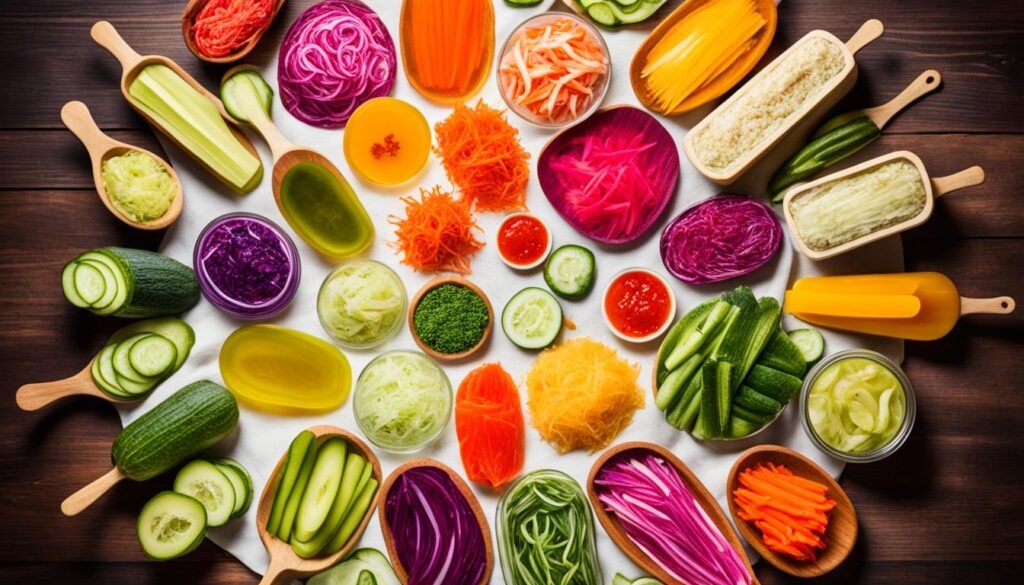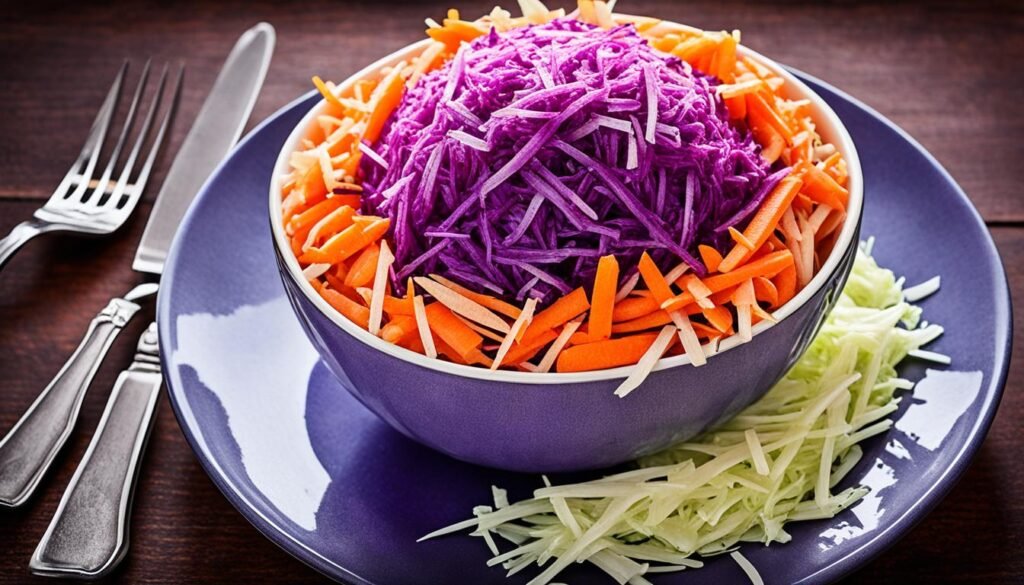Fermentation makes food last longer. It gives our gut more friendly bacteria, or probiotics.1 This happens when bacteria and yeast break down sugars. Probiotics are good for us. They help our digestion and boost our immune system. They even help with losing weight. Here are 8 foods and drinks that help our health and digestion.
Fermented foods taste strong and are rich in nutrients.1 These foods come from vegetables, beans, and milk. They have many vitamins and minerals. Fermentation removes parts that can block nutrients. This makes the good stuff in our food easy for our bodies to use.1 So, fermented foods give us more of the vitamins and minerals we need.
Key Takeaways
- Fermented foods like kefir, kimchi, and sauerkraut can boost gut health and digestive function.
- Fermentation increases the bioavailability of nutrients in foods, allowing our bodies to better absorb essential vitamins and minerals.
- Consuming a variety of fermented foods can support immune health, reduce inflammation, and even lower cholesterol levels.
- The fermentation process produces beneficial probiotics that help maintain a healthy gut microbiome.
- Incorporating fermented foods into your diet can be an effective way to support overall health and wellness.
The Power of Fermentation
Fermentation is a process where bacteria and yeast turn sugars into other stuff. Besides making food last longer, it adds good bacteria to your gut.2 These good bacteria are called probiotics. They do cool things like make your digestion better, keep you healthy, and even help with losing weight.2
Probiotics and Digestive Health
Probiotics from fermented foods work hard to keep our guts in check. They fight off the bad guys and make sure our gut wall is strong.2 Taking probiotics in a pill form is also getting very popular. It’s a stronger way to get lots of probiotics at once.2
The Fermentation Process
Fermentation gets rid of certain things in food that block our bodies from using all the nutrients.2 This process lets our bodies grab more vitamins and minerals from the food we eat.2 It also makes food richer in helpful compounds.2
Enhancing Food Preservation
Thanks to fermentation, foods like sauerkraut, kimchi, and yogurt are full of helpful bacteria. These foods can add to the good bacteria in our guts.3 Eating things like yogurt, kefir, and kombucha is great for your gut health.2 But always check with a doctor before changing your diet too much, especially with these kinds of foods.2
Kefir: A Tangy Probiotic Beverage
Kefir is a fermented dairy product. It’s made by mixing kefir grains with milk. This creates a creamy drink that tastes a bit like yogurt. Many believe kefir is good for your digestion and can help reduce swelling.4
Improved Lactose Digestion
Kefir has lower lactose levels than milk. The bacteria in the grains eats up much of the lactose. This makes kefir a wise choice for folks who have trouble with dairy.5
Anti-Inflammatory Properties
Drinking kefir might lower body inflammation. In a special test, having 6.7 ounces of kefir daily for 6 weeks reduced inflammation markers. These markers can lead to serious health issues like heart disease and cancer.4
Bone Health Benefits
Kefir doesn’t just help your stomach. It can make your bones stronger too. A study over 6 months found that kefir could increase bone strength in folks with osteoporosis. This is likely because kefir is full of nutrients vital for good bone health, such as calcium, phosphorous, and more.54

Tempeh: A Versatile Soy-Based Superfood
Tempeh is made by fermenting soybeans into a cake. It is a high-protein meat substitute that can be prepared in several ways. These include baking, steaming, or sautéing before use.6 Tempeh is filled with nutrients that are good for you. For instance, its soy protein can lower the risk of heart disease. Studies even suggest that its plant chemicals work as antioxidants, fighting damage caused by free radicals.6
7 A cup of tempeh packs approximately 31 grams of protein. This makes it a valuable high-protein option from plants.7 Tempeh also supports your gut health with its rich fiber. It leaves you feeling full too. As a probiotic food, it helps maintain a strong immune system.7 It’s also known for its ability to squash inflammation and shield cells from harm.
7 To prepare traditional tempeh, soybeans are fermented and shaped into block cakes. You can find it in many styles, such as sheets, strips, cubes, or crumbles. It works well in salads and sauces.7 When you cook it, tempeh offers a crispy texture with a taste similar to nuts. It can be the star of any meal providing plenty of protein.
7 Making tempeh includes steps like boiling soybeans and fermenting them with a fungus. This process takes one to two days to complete.6 Although generally safe, those allergic to soy should avoid it. If you have a thyroid issue, limit your tempeh intake. This is because tempeh contains goitrogens, substances that can affect the thyroid.6 Tempeh is very versatile. You can use it in foods like tempeh bacon, sandwiches, lettuce wraps, and BBQ dishes by baking, crumbling, or sautéing it.
Natto: A Japanese Fermented Soybean Delight
Natto is a key food in Japan, much like tempeh, and is known for its fermented soybeans. It has been part of Japanese food culture for more than a thousand years, since the Heian period.8 Across the Edo period, natto became more popular, especially in the northeast of Japan.8 It’s known to help against heart disease, keep bones strong, and lower blood pressure.8 Making natto has become easier over time without losing its traditional flavor.8 Now, it’s known around the world, and many cooks and health experts talk about its benefits and use it in various meals.8
Fiber for Digestive Regularity
Each 3.5-oz of natto has 5.4 grams of fiber, which is great for the body.8 Fiber helps the digestive system by staying undigested and making the stool larger. This helps to avoid constipation.
Bone-Protecting Vitamin K
It’s also rich in vitamin K that helps our bones stay strong.8
Nattokinase: A Potential Blood Clot Dissolver
Natto’s fermentation creates nattokinase, an enzyme that can help with clotting and blood pressure.8 Natto is full of good nutrients like probiotics, antioxidants, vitamins C and K2, thanks to the fermentation with Bacillus subtilis. This process is done over 24 hours in a warm place.8 The flavor of natto is unique, with deep and nutty hints. It often pairs well with soy sauce, green onions, and Japanese mustard.8
Kombucha: The Fizzy Fermented Tea
Kombucha is a fizzy and tangy drink made from tea. It can be created using green or black tea. This drink is loved for its unique taste and the benefits it brings to health.9 For instance, research in animals shows it might help keep the liver healthy.9 Other studies not in animals suggest it could have a role in fighting cancer.9
Liver Protection
Animal studies have discovered some benefits of drinking kombucha. They found it might lower blood sugar and bad cholesterol. This is thought to be because of the antioxidants in kombucha.9
Potential Cancer-Fighting Properties
Kombucha has been a favorite for over 2,000 years as it’s known to have health perks.10 Today, its market size is huge and keeps growing. By 2027, it’s expected to be worth $5.8 billion.11
Blood Sugar and Cholesterol Management
When kombucha is made at home, it’s even more packed with antioxidants than those from stores. This tasty drink is also a better choice than sugary iced teas.11

10 In the last ten years, kombucha sales worldwide went up drastically. Part of its appeal is that it’s mostly alcohol-free, making it safe for all ages. This is because the natural alcohol levels are incredibly low.10 However, some types of kombucha can have more alcohol, especially the ones called “hard” kombuchas.11
9 Regular kombucha has tiny amounts of alcohol, around the same as a very ripe fruit. It’s low in calories and sugar, making it a good choice for your health. Kombucha also has a little bit of caffeine, which can be good for a quick energy boost.9 It’s known to help your stomach work better and get rid of toxins.9 But, too much can cause problems like headaches and an upset stomach.9
9 You can find ready-made kombucha at the store or buy it online.9 Once opened, it can be kept fresh in the fridge for about a week.910 The CDC says it’s fine to have up to 4 ounces a day. This amount is safe for most people.1011 It’s a smart idea to rinse your mouth after drinking kombucha. This will help keep your teeth healthy by reducing acid damage.11
Miso: A Flavorful Japanese Seasoning
Miso is a popular Japanese seasoning. It’s made by mixing soybeans with salt and koji, a type of fungus. Studies show health benefits from eating miso. One study with over 21,000 Japanese women found that miso soup lowers the risk of breast cancer.4 Another study with over 40,000 people showed that more miso soup means less risk of stroke in Japanese women.12
Reduced Risk of Certain Cancers
Isoflavones in miso help prevent certain cancers, like breast, prostate, lung, colon, liver, and stomach cancers.12
Heart Health Benefits
Miso might lower blood pressure and improve heart health. Places where miso is common have less heart disease. People eating miso soup often (7 or more times a week) have lower heart rates than less frequent eaters.12
Potential Sodium Concerns
Yet, miso can be high in salt and bring health risks. Japanese researchers link eating a lot of miso soup to a higher risk of stomach cancer. This is because stomach cancer is more common with a lot of salt in the diet.12

Fermented Foods For Gut Health
Kimchi: A Korean Fermented Vegetable Powerhouse
Kimchi is a beloved Korean dish. It’s made from fermented cabbage or pickled veggies like radishes. This tasty dish has many health bonuses. For instance, it can cut down on cholesterol and make your body more sensitive to insulin3.
In one test, folks with prediabetes showed better health markers after eating fermented kimchi. They had lowered insulin resistance, blood pressure, and dropped some weight compared to those who had regular, non-fermented kimchi.3 Another research found that more kimchi in the diet linked to better blood sugar, cholesterol, and lower bad LDL cholesterol3.
Insulin Resistance and Cholesterol Reduction
Fermented foods such as kimchi are great for your health. They can make your metabolism run smoother by lowering insulin resistance and cutting down on bad cholesterol. A fresh study in 2021 showed this. It revealed a drop in harmful markers when folks had six servings of these foods daily. They also saw better balance in their gut bacteria when compared to just adding more fiber to their diets3.
This superfood is not just tasty but also packed with good bacteria like Lactobacilli, fiber, and compounds that fight off bad cholesterol and boost your immune system3.

Sauerkraut: A Probiotic-Rich Condiment
Sauerkraut is made from fermented cabbage. It’s low in calories and full of fiber. It also has essential vitamins C and K.13 This food is rich in probiotics, which can help your health. It might improve eye health and ease IBS symptoms.
Eye Health Support
Sauerkraut has lutein and zeaxanthin. These are strong antioxidants that support eye health.13 They shield the eyes from blue light and UV rays. This could lower eye disease risks, such as macular degeneration and cataracts.
Relief for Irritable Bowel Syndrome
A study showed sauerkraut can help those with IBS. It improved their symptoms.14 The probiotics in sauerkraut balance the gut. This leads to better digestion and less discomfort for IBS patients.14

But, not all sauerkraut at the store has live cultures.15 For the best health benefits, choose raw, unpasteurized sauerkraut. Watch the fermentation and ingredients used too.15 It’s smart to talk to your doctor before adding sauerkraut if you have health issues.14
Adding sauerkraut to your meals is easy and tasty. It supports eye health, eases IBS, and helps your digestion.131514
The Nutrient-Boosting Power of Fermentation
The fermentation process removes “anti-nutrient” compounds from select foods. These compounds can stop our body from fully pulling in nutrients. So, with fermentation, our body gets more of the needed vitamins and minerals from the food itself. This makes fermented foods rich in essential nutrients, perfect for every meal.
Fermentation turns complex nutrients into simpler, more available forms. This makes it easy for our body to soak up and use the vitamins and minerals. Fermented foods are key in enhancing our nutrient bioavailability and vitamin and mineral absorption. Plus, they help keep our gut healthy through the fermentation process.161718
Conclusion
Adding probiotic-rich foods to our diet is smart. Foods like kefir, tempeh, and kombucha are great. They help our guts stay healthy. Fermentation makes essential vitamins easier for our bodies to use.1
Fermented foods do a lot of good for us. They can make our digestion and immune system better. They also lower our cholesterol and fight inflammation.19 Studies show that these foods boost our gut health. They do this by introducing good bacteria.
There’s still a lot to learn about fermented foods. They promise to make us healthier. They do this by making our gut full of happy microbes.20
FAQ
What are the health benefits of fermented foods?
How does fermentation work?
What are some examples of probiotic-rich fermented foods?
What are the benefits of drinking kefir?
How is tempeh made, and what are its health benefits?
What are the unique properties of natto?
What are the potential health benefits of drinking kombucha?
How can miso improve health?
What are the benefits of eating kimchi?
How can sauerkraut support health?
Source Links
- https://www.ncbi.nlm.nih.gov/pmc/articles/PMC9003261/
- https://www.bswhealth.com/blog/the-power-of-fermented-foods
- https://www.health.com/fermented-foods-7970958
- https://www.healthline.com/nutrition/8-fermented-foods
- https://www.realsimple.com/food-recipes/cooking-tips-techniques/what-is-kefir
- https://www.healthline.com/nutrition/tempeh
- https://www.bobsredmill.com/blog/healthy-living/what-is-tempeh-made-of/
- https://www.bokksumarket.com/blogs/magazine/unveiling-natto-fermented-soybean
- https://www.webmd.com/diet/the-truth-about-kombucha
- https://health.clevelandclinic.org/what-are-kombuchas-health-benefits-and-how-much-can-you-safely-drink
- https://www.washingtonpost.com/wellness/2023/07/10/kombucha-gut-probiotics-antioxidants/
- https://www.eatingwell.com/underrated-fermented-food-you-should-be-eating-more-of-8418714
- https://www.healthline.com/nutrition/benefits-of-sauerkraut
- https://nutranourish.com/blog/unlocking-the-kraut-the-best-time-to-eat-sauerkraut-for-gut-health/
- https://wholeisticliving.com/2022/06/20/best-sauerkraut-for-probiotics-and-gut-health/
- https://www.healthline.com/nutrition/fermentation
- https://www.elle-md.com/unlocking-the-power-of-fermented-foods-a-journey-to-gut-health-and-wellness
- https://www.webmd.com/diet/ss/slideshow-benefits-fermented-foods
- https://practicalgastro.com/2023/04/14/fact-vs-fiction-fermented-foods-and-gut-health/
- https://www.ncbi.nlm.nih.gov/pmc/articles/PMC6723656/

